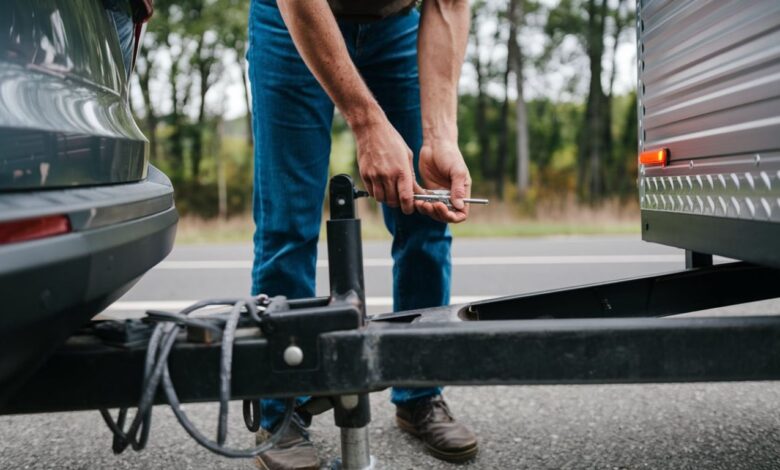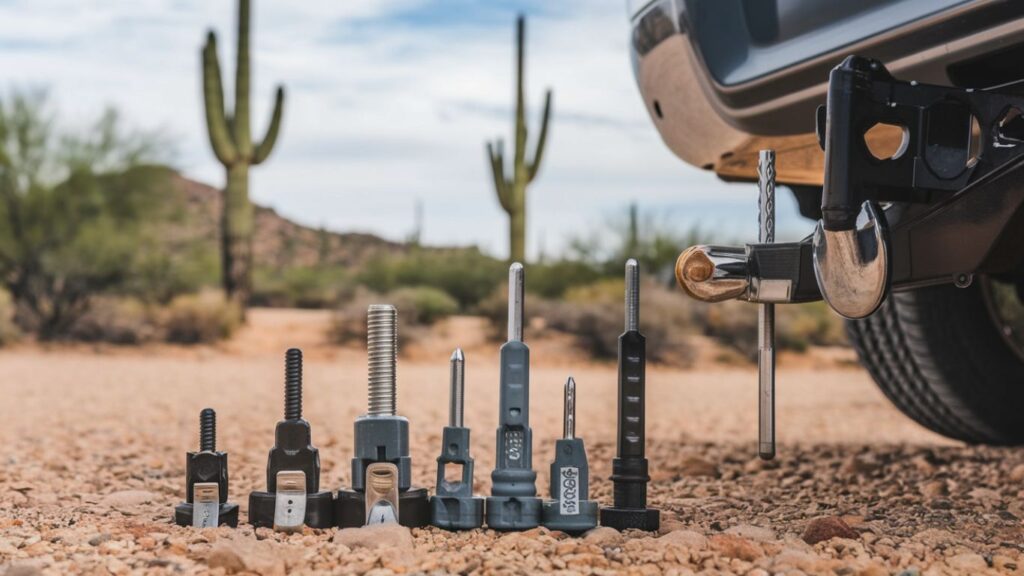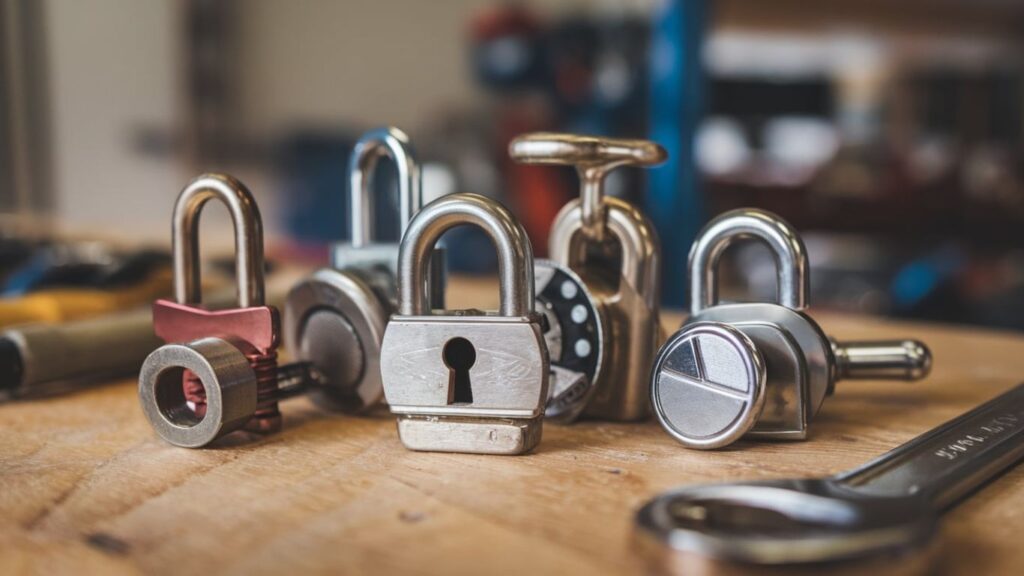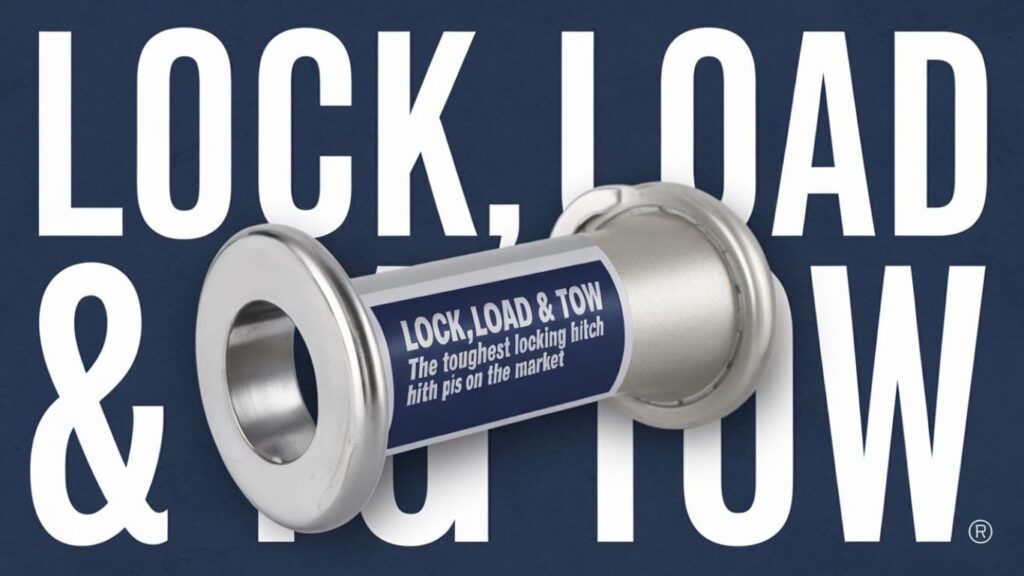Lock, Load & Tow: The Toughest Locking Hitch Pins on the Market

When it comes to towing, safety and security should never be an afterthought. Whether you’re hauling a trailer, boat, or bike rack, a single component often determines whether your gear stays protected: the locking hitch pin. This small but critical device ensures your hitch connection is secure and helps deter theft when your trailer is unattended.
In this article, we’ll explore what a locking hitch pin is, why you need one, how it works, and how to choose the right one for your towing setup.
What Is a Locking Hitch Pin?

A locking hitch pin is a steel pin with a locking mechanism designed to secure your trailer hitch and accessories to your vehicle. Unlike regular hitch pins, which can be pulled out easily, locking hitch pins have built-in or external locks—either key-based or combination—making them tamper-resistant.
These pins are commonly made from corrosion-resistant materials like stainless steel or chrome-plated hardened steel, ensuring durability even in harsh weather conditions.
Why You Need a Locking Hitch Pin
Do Hitch Locks Prevent Theft?
Yes! One of the biggest advantages of using a locking hitch pin is theft prevention. Trailers, campers, and even bike racks can be easily stolen if not secured. A standard pin can be removed in seconds, while a locking pin makes it significantly harder for thieves to access your gear.
Can You Drive with a Hitch Lock On?
Absolutely. Locking hitch pins are designed to be driven with. They provide peace of mind during transit by ensuring your hitch doesn’t accidentally detach, even over bumpy roads or rough terrain.
Types of Locking Hitch Pins
There are several variations of locking hitch pins to suit different towing needs:
- Receiver Hitch Locks – These secure the ball mount to the hitch receiver and are available in sizes like 1/2″, 5/8″, and more.
- Coupler Locks – Used to secure the trailer’s coupler so it can’t be connected to another vehicle.
- Straight vs. Bent Pins – Straight pins are more commonly used with locking mechanisms for a flush, low-profile fit.
- Keyed vs. Combination Locks – Choose keyed for ease, or combination for key-free convenience.
Key Features to Look For in a Locking Hitch Pin

When selecting the best locking hitch pin, consider the following:
- Material Strength – Hardened steel or stainless steel prevents cutting, bending, and rust.
- Weatherproof Coating – Protects against corrosion and moisture buildup.
- Ease of Use – Quick locking and unlocking without tools.
- Compatibility – Ensure the pin fits your hitch size and receiver class.
How to Use and Install a Locking Hitch Pin
How Is a Hitch Pin Used?
- Align your hitch and accessory with the receiver.
- Slide the pin through the holes in the receiver and mount.
- Attach the lock end and secure it with the key or combination.
- Double-check by pulling gently on the lock to ensure it’s secure.
How to Lock a Hitch Pin?
Once inserted, simply slide or screw on the lock and rotate the key to lock it in place. Ensure the lock is weather-sealed with a rubber cover to protect it from road debris and moisture.
Common Mistakes to Avoid
- Wrong Pin Size – A pin too small or too long may not hold your hitch securely.
- No Lubrication – A dry pin can rust. Occasionally, use WD-40 or silicone lubricant.
- Key Left in Lock – Always remove the key to prevent theft.
- Assuming Universal Fit – Always measure your hitch before purchasing.
Best Locking Hitch Pins of 2025

Here are three standout models you should consider:
- Trimax SXTC123 – Heavy-duty, anti-rust lock with a double ball-bearing mechanism.
- Master Lock 2866DAT – Swivel head for easy access and a weatherproof keyhole cover.
- Reese Towpower 7031400 – Push-to-lock system and fits most 2″ and 2-1/2″ receivers.
Each offers reliable security, excellent materials, and solid customer feedback.
Frequently Asked Questions
What is a locking hitch pin?
A locking hitch pin is a security device used to secure the ball mount or other hitch accessories to the receiver tube of a trailer hitch. It typically features a key or combination lock that prevents unauthorized removal.
Are locking hitch pins worth it?
Yes, locking hitch pins are worth it for anyone who wants to prevent theft of their trailer, bike rack, or cargo carrier. They offer a simple yet effective layer of protection.
What is the use of a hitch lock?
A hitch lock secures your trailer or towing accessory to the tow vehicle, preventing theft by making it difficult for someone to remove or hook up your trailer without authorization.
What is the pin called for a hitch?
The pin used for a hitch is commonly referred to as a hitch pin. When it includes a locking mechanism, it’s called a locking hitch pin.
Are hitch locks easy to break?
While some low-quality hitch locks can be compromised with basic tools, high-quality locks made from hardened steel are much more resistant to tampering and difficult to break.
Can hitch pins break?
Yes, hitch pins can break, especially if they are made from low-grade materials or are subjected to loads beyond their rated capacity. Using hardened or heavy-duty hitch pins reduces this risk.
How does a locking pin work?
A locking pin works by inserting through the hitch receiver and ball mount or accessory shank, then locking with a key or combination mechanism, preventing removal.
Can you drive with a hitch lock on?
Yes, you can drive with a locking hitch pin on. However, coupler locks (used on trailer tongues) should be removed before towing, as they are not meant for use while driving.
How is a hitch pin used?
A hitch pin slides through aligned holes in the hitch receiver and the accessory (such as a ball mount), then is secured with a clip or lock to hold everything in place.
Do hitch locks prevent theft?
Yes, hitch locks significantly reduce the risk of trailer or hitch accessory theft. While no lock is entirely theft-proof, a good hitch lock can deter most thieves.
What is the most difficult lock to break?
Locks made with hardened steel, like Abloy Protec2 or Medeco M3, are considered among the most difficult to break or pick.
Can a hitch break?
Yes, a hitch can break if overloaded or used improperly. Regular inspection and using hitches rated for your towing load are essential to prevent failures.
Are hitch pins standard?
Hitch pins come in standard diameters like 1/2-inch, 5/8-inch, and 3/4-inch, corresponding to different hitch classes. It’s important to match the pin size to your hitch receiver.
Are hitch pins hardened?
High-quality hitch pins are made from hardened steel, which improves strength and resistance to cutting or bending.
Why use a shackle hitch?
A shackle hitch provides a strong and secure point for recovery straps or tow ropes, making it ideal for off-roading and heavy-duty towing.
Do hitch locks work?
Yes, hitch locks work effectively when properly installed and maintained. They act as a deterrent and increase the effort and time needed to steal a trailer or accessory.
What is a 4-pin hitch?
A 4-pin hitch refers to a 4-way trailer wiring connector used for basic trailer lighting: tail lights, brake lights, and turn signals.
What is a smart tow?
“Smart tow” often refers to trailer towing systems with integrated electronic features, such as backup assist, sway control, or Bluetooth monitoring.
What is the strongest lock ever?
The Abloy Protec2 and Mul-T-Lock MT5+ are often considered the strongest consumer-grade padlocks due to their anti-drill, anti-pick, and anti-bump features.
What is the weak point of a lock?
The weak points of most locks include the shackle, locking mechanism, and keyway, especially if they’re not reinforced or are made from soft materials.
Is there a lock that cannot be picked?
While almost all locks can technically be picked with enough time and skill, disc-detainer locks like the Abloy Protec2 are extremely difficult to pick and considered virtually pick-proof.
What is the purpose of a hitch?
A hitch allows a vehicle to tow trailers or attach accessories like bike racks, cargo carriers, or towing winches.
What is a D-shackle?
A D-shackle is a metal loop-shaped shackle with a pin or bolt across the opening, often used in towing or lifting applications.
What can a hitch be used for?
Hitches are used for towing trailers, hauling equipment, mounting bike racks, cargo carriers, and even winch systems in off-road vehicles.
How to lock a hitch pin?
To lock a hitch pin, insert the pin through the hitch and accessory, then attach the locking mechanism and secure it with the key or combination.
What is a 7-pin hitch?
A 7-pin hitch refers to a trailer wiring connector that provides signals for lights, electric brakes, reverse lights, and auxiliary power.
What is a kingpin hitch?
A kingpin hitch is the connection point for fifth-wheel trailers, used primarily on large RVs or commercial trailers, and engages with a hitch mounted in a truck bed.
What type of wire for the trailer?
Trailer wiring commonly uses 16- to 10-gauge stranded copper wire, with specific colors designated for turn signals, brakes, and lighting.
What type of hitch is best?
The best hitch depends on your towing needs:
- Class I–II: light-duty (bikes, small trailers)
- Class III–IV: mid- to heavy-duty (boats, campers)
- Class V/Gooseneck/5th wheel: for heavy trailers and RVs
How thick is a hitch pin?
Hitch pin thickness varies, with the most common sizes being:
- 1/2 inch for Class I–II hitches
- 5/8 inch for Class III–V hitches
Which lock is stronger?
Hardened steel padlocks, especially disc-detainer models, are typically the strongest and most secure for hitch protection.
What is a 2-point lock?
A 2-point lock secures in two places simultaneously, often found on doors or trailers for added resistance against prying.
What is the locking level?
The locking level indicates a lock’s security rating, with higher levels signifying better resistance to picking, drilling, or cutting.
What is the disadvantage of locking?
A potential disadvantage is that keys can be lost, or the lock may corrode if not maintained, potentially causing inconvenience.
What is the basic weakness?
The basic weakness of most locks lies in material strength or keyway design, which can be exploited using force or picking tools.
What is the lock position?
The lock position refers to whether the pin is in the locked or unlocked state, often indicated visually or audibly on locking hitch pins.
What is a Class 5 hitch?
A Class 5 hitch is designed for the heaviest towing, with a GTW (gross trailer weight) of up to 20,000 lbs, and a tongue weight of up to 2,000 lbs.
How to convert a 7-pin to a 4-pin?
Use a 7-to-4 pin adapter, which plugs into the vehicle’s 7-pin connector and allows use of a 4-pin trailer plug.
Which pin is for the electric brakes?
In a 7-pin connector, pin #2 (usually blue wire) is for electric brake control.
Which door is stronger?
A solid core or steel door is stronger than a hollow-core or wood-paneled door, offering better resistance to forced entry.
What is an Abloy padlock?
An Abloy padlock uses a disc-detainer mechanism that offers high resistance to picking, drilling, and weather, making it a top choice for hitch and trailer security.
What is the world’s toughest lock?
The Abloy Protec2 and Mul-T-Lock Hercular are considered among the world’s toughest locks due to their construction and security features.
What is a hitch?
A hitch is a device attached to a vehicle’s chassis that enables towing of a trailer or attachment of cargo accessories.
What is the TW capacity?
TW (Tongue Weight) capacity is the downward force exerted on the hitch ball by the trailer. It’s crucial for safe towing and balance.
What is a gooseneck hitch?
A gooseneck hitch mounts in the truck bed and is used for heavy-duty towing, offering tighter turning and more stability compared to bumper hitches.
What is the most commonly used hitch?
The Class III receiver hitch is the most commonly used for general towing, offering versatility and support for many trailers and accessories.
What is a pintle hitch?
A pintle hitch uses a hook and ring system, popular for heavy-duty industrial and military towing due to its durability and articulation.
What are the benefits of a hitch?
Benefits include:
- Towing capability
- Accessory mounting
- Versatility for cargo management
- Increased vehicle utility
Conclusion: Lock It and Tow with Confidence
A locking hitch pin isn’t just an accessory—it’s a necessity. From securing your trailer against theft to ensuring a safe journey, this simple device can save you thousands in loss and damage. Choose quality, match it to your hitch type, and regularly maintain your lock for long-term reliability.
Whether you tow across town or cross-country, lock, load, and tow with the toughest locking hitch pins on the market.
READ MORE : Buzznewsdaily




